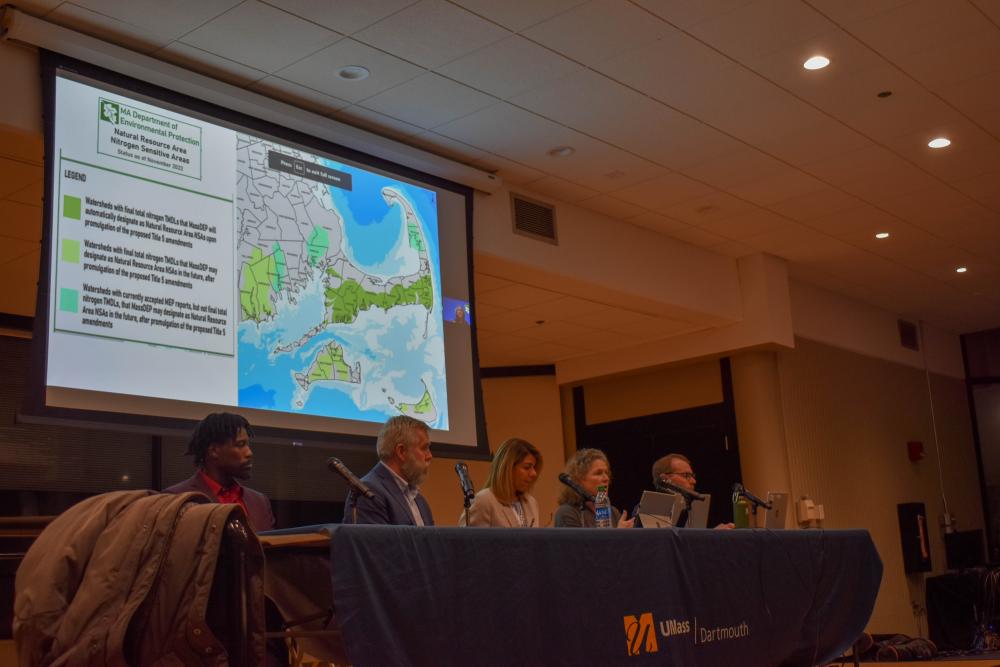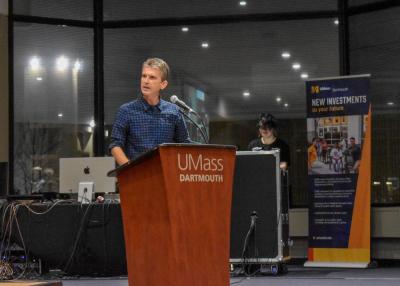Town intends to take legal action against MassDEP
The Town of Dartmouth intends to take legal action against the state’s Department of Environmental Protection, Select Board Member Shawn McDonald announced Jan. 18.
This comes in response to the department's proposed changes to its septic system regulations, something McDonald said several Dartmouth officials believe was done “illegally.”
“We’re going to be filing an open meeting law violation with MassDEP with the [Massachusetts] Attorney General’s Office,” he said.
The announcement came during MassDEP’s Jan. 18 informational session at UMass Dartmouth — a meeting which saw dozens of residents and South Coast officials voice their opposition to the state’s proposed changes to its septic systems.
The state is currently proposing residents living along estuaries connected to Buzzards Bay replace their systems with ones containing nitrogen-filtering technology as part of an effort to decrease pollutants in the region’s waterways. Proponents argue that revising the regulations is the best step to take to ensure clean waters, while local officials are skeptical if this is the most effective route to take.
Along with the declaration of filing the open meeting violation, McDonald questioned DEP officials on why South Coast communities were left out of the decision-making process — one of many frustration officials and residents have expressed.
“We should have been there,” McDonald said. “That’s part of good, open government.”
In response, Millie Garcia-Serrano — the regional director of MassDEP’s Southeast Office — said that the department has held 50 meetings with communities on the Cape, South Shore, and South Coast since announcing the proposed regulations last summer.
Just prior to the state’s informational session, the Dartmouth Select Board held a joint meeting with representatives from the towns of Acushnet, Freetown, Rochester, Rehoboth, and Freetown.
All South Coast officials in attendance were in agreement that while it is important to keep the region’s waterways clean, the state’s proposal is not the way to go.
“It goes counter to what we as public health officials do for their community members,” said Freetown Public Health Agent Keven Desmarais.
After more than an hour of discussion on the proposed regulations, the group decided to have local boards of health and select boards draft letters of opposition to the Department of Environmental Protection.
“We’re not going to do it alone,” Dartmouth Select Board Chair David Tatelbaum said.
Many homeowners in attendance at the informational session questioned the price of the systems.
Some estimates put the cost of new systems at upward of $50,000 per installation. Although Marybeth Chubb, who works at MassDEP’s Boston office, said the price is “only” $15,000 to $30,000 per system.
“Yeah, ‘only,’” one resident shouted.
Chubb added that the new systems would have an annual operating cost of $1,000 to $2,000.
“I’m going to need a side gig,” a homeowner said.
The same day of the meeting, Dartmouth’s representatives to Beacon Hill, State Sen. Mark Montigny (D-New Bedford) and State Rep. Chris Markey (D-Dartmouth) filed legislation that would prevent MassDEP from imposing these upgrades unless it is part of a watershed permit requested by the town and funded by the state.
Several homeowners and officials questioned why the state is hyperfocused on septic as a major pollutant instead of wastewater discharges from the City of New Bedford into Clark’s Cove.
The cove feeds directly into Buzzards Bay.
Lealdon Langley, MassDEP’s Director Watershed Management said New Bedford is working on controlling its combined sewer overflows, much to the displeasure of the audience.
Dartmouth’s Public Health Agent Chris Michaud also had several questions for the panel of state officials in attendance. Questions included why they have not responded to any of his records requests, and why MassDEP has allegedly put up a job posting regarding the regulations, which have yet to be approved.
“This is a done deal,” he said.
Michaud’s questions were not immediately addressed by any of the MassDEP officials, which resulted in members of the public shouting at state officials to respond.
Garcia-Serrano eventually responded by saying that “MassDEP continues to work with all the affected parties here.”
“I hope tonight is the beginning of a very important conversation,” she said.
MassDEP will hold additional public hearings on Jan. 24 and 25. The meetings will be conducted virtually. For more information, visit www.mass.gov/regulations/310-CMR-15000-septic-systems-title-5.
The state is also accepting written comments until 5 p.m. on Jan. 30. Comments can be submitted by email to dep.talks@mass.gov and must include “Title 5 and Watershed Permit'' in the subject line.
All comments submitted must include the name and contact information of the resident.
This story has been updated to include information from a meeting held just prior to MassDEP’s informational session.












